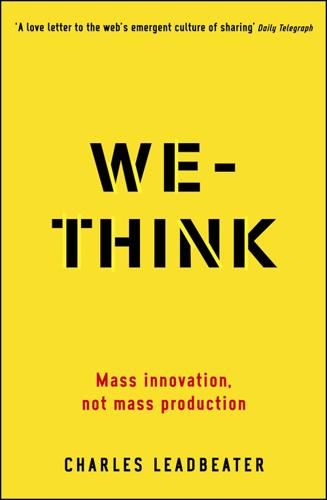
We-Think: Mass Innovation, Not Mass Production
by
Charles Leadbeater
Published 9 Dec 2010
Available from http:// www.msnbc.msn.com/id/12015774/site/newsweek 16 Fred Turner, From Counterculture to Cyberculture (Chicago, IL/London: University of Chicago Press, 2006) 17 Patrice Flichy, The Internet Imaginaire (Cambridge, MA: MIT Press, 2007) 18 Charles Leadbeater, ‘The DIY State’, Prospect 130, January 2007 19 Fred Turner, op. cit. 20 John Markoff, What the Dormouse Said: How the Sixties Counterculture Shaped the Personal Computer Industry (Penguin, 2006) 21 Patrice Flichy, The Internet Imaginaire (Cambridge, MA: MIT Press, 2007) 22 Jonathan Lethem, ‘The Ecstasy of Influence’, Harper’s Magazine, February 2007 23 Garrett Hardin, ‘The Tragedy of the Commons’, Science 162 (1968), pp. 1243–48 24 Elenor Ostrom, Governing the Commons (Cambridge University Press, 1990) 25 Lawrence Lessig, Code and Other Laws of Cyberspace (New York, NY: Basic Books, 1999) and Free Culture (New York, NY: Penguin Press, 2004) 26 Melvyn Bragg, The Routes of English (BBC Factual and Learning, 2000); Melvyn Bragg, The Adventure of English (Hodder & Stoughton Ltd, 2003) 27 Jonathan Lethem, ‘The Ecstasy of Influence’, Harper’s Magazine, February 2007 28 Cory Doctorow et al., ‘On “Digital Maoism: The Hazards of the New Online Collectivism” By Jaron Lanier’, Edge (2006). http://www.edge.org/discourse/digital_ maoism.html 29 Paul A. David, ‘From Keeping “Nature’s Secrets” to the Institutionalization of “Open Science”‘, in Rishab Aiyer Ghosh (Ed.), Code (Cambridge, MA/London: MIT Press, 2005) 30 Alessandro Nuvolari, ‘Open Source Software Development: Some Historical Perspectives’, Eindhoven Centre for Innovation Studies Working Paper 03.01 (2003); Koen Frenken and Alessandro Nuvolari, ‘The Early Development of the Steam Engine: An Evolutionary Interpretation Using Complexity Theory’, Eindhoven Centre for Innovation Studies Working Paper 03.15 (2003) Chapter 3 1 Andrew Brown, In the Beginning Was the Worm (Pocket Books, 2003) 2 Eric S.
…
., 80 Years of Thinking at the Phillips Natuurkundig Laboratorium 1914–1994 (Amsterdam: Pallas, 2005) DiBona, Chris, Danese Cooper and Mark Stone (Eds), Open Sources 2.0 (O’Reilly, 2006) DiBona, Chris, Sam Ockman and Mark Stone (Eds), Open Sources: Voices from the Open Source Revolution (O’Reilly, 1999) Di Maggio, Paul (Ed.), The Twenty-first-Century Firm (Princeton University Press, 2001) Doctorow, Cory, et al. ‘On “Digital Maoism: The Hazards of the New Online Collectivism” By Jaron Lanier’, Edge, (2006). See http://www.edge.org/discourse/digital_ maoism.html Dodgson, Mark, David Gann and Ammon Salter, Think, Play, Do: Technology, Innovation and Organization (Oxford University Press, 2005) Dodson, Sean, ‘Show and Tell Online’, Guardian, 3 February 2006 Dravis, Paul, Open Source Software: Perspectives for Development (Washington, DC: InfoDev, 2003) Ducheneaut, Nicolas, Nicholas Yee, Eric Nickell and Robert J.
…
And then there is monarchy – that’s me – but I try to get involved as little as possible. The most contentious question about Wikipedia is the one that really matters: how good an encyclopaedia is it? Sanger argues that its quality is questionable because its experts do not vet amateur contributions. In an influential online essay cultural critic Jaron Lanier branded it a form of digital Maoism on the grounds that it promotes an anonymous collective account of knowledge that on any subject favours the often inaccurate lowest common denominator. Others allege that Wikipedia licenses gossip and falsehoods to masquerade as truth, because contributions are often not checked fully. The answer is that we do not yet know how good Wikipedia is or will become.
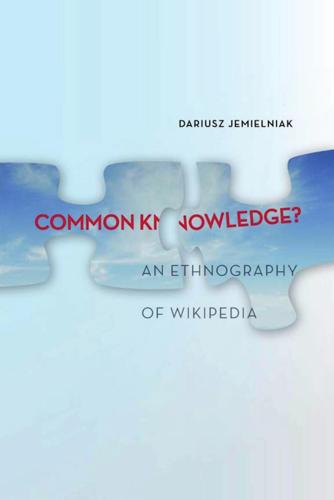
Common Knowledge?: An Ethnography of Wikipedia
by
Dariusz Jemielniak
Published 13 May 2014
Additionally, I discuss the future of the Wikimedia community. Hive Minds, Schmucks, Losers, and Other Misconceptions About Wikipedia Some say that the contemporary Internet in general, and Wikipedia in particular, promotes amateurs and everyday Joes—that Wikipedia’s “hive mind mentality” and “digital Maoism” suppress human intelligence and dilute individual judgments and tastes (Lanier, 2006). Andrew Keen, the author of the ominously titled The Cult of the Amateur: How Today’s Internet Is Killing Our Culture (2007), even states in an interview that no normal person would give away labor for free and anonymously and that “only schmucks would do that.
…
Retrieved August 23, 2013, from http:// meta.wikimedia.org/wiki/Benevolent_dictator Benkler, Y. (2002). Coase’s penguin, or, Linux and “the nature of the firm.” Yale Law Journal, 112(3), 369–446. Benkler, Y. (2006a). Extracting signal from noisy spin. The Edge. Retrieved from http:// www.edge.org/discourse/digital_maoism.html Benkler, Y. (2006b). The wealth of networks: How social production transforms markets and freedom. New Haven, CT: Yale University Press. Benkler, Y. (2011). The penguin and the leviathan: How cooperation triumphs over selfinterest. New York: Crown Business. Benkler, Y., & Nissenbaum, H. (2006).
…
When the Wikipedians talk: Network and tree structure of Wikipedia discussion pages. In Proceedings of the Fifth International Conference on Weblogs and Social Media (pp. 177–184). Menlo Park, CA: AAAI Press. Retrieved from http://www.aaai.org/ocs/index.php/ICWSM/ ICWSM11/paper/viewFile/2764/3301 Lanier, J. (2006, May 29). Digital Maoism: The hazards of the new online collectivism. The Edge. Retrieved from http://www.edge.org/3rd_culture/lanier06/lanier06 _index.html Latour, B. (1986). The powers of association. In J. Law (Ed.), Power, action and belief: A new sociology of knowledge? London: Routledge & Kegan Paul. Latour, B., & Woolgar, S. (1979).
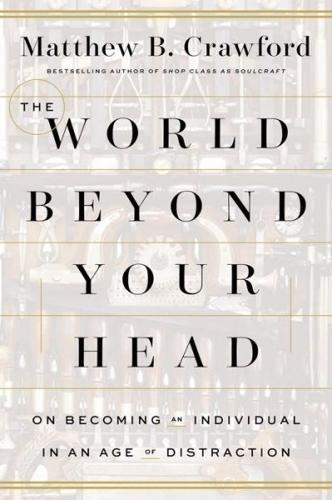
The World Beyond Your Head: On Becoming an Individual in an Age of Distraction
by
Matthew B. Crawford
Published 29 Mar 2015
And if they can identify with the CEO, they will be less likely to feel themselves in an antagonistic relation to those who manage the appropriation of their surplus labor value on behalf of Chinese shareholders. 7. Jaron Lanier, “Digital Maoism: The Hazards of the New Online Collectivism,” Edge, May 29, 2006, available at http://edge.org/conversation/digital-maoism-the-hazards-of-the-new-online-collectivism. 13. THE ORGAN MAKERS’ SHOP 1. I imagine the appeal of this image may have something to do with the fact that it allows the venture capitalists who hang around Silicon Valley to view themselves in a certain cultural role, as midwives to the new.
…
In countless little ways, any single one of which seems trivial, this liberal arts college is unthinkingly repeating bits of Silicon Valley ideology that would seem to undermine the rationale for studying the liberal arts. The university has become “the brilliant ally of its own gravediggers,” to borrow a phrase from Milan Kundera.6 Jaron Lanier criticizes what he calls “digital Maoism,” a “new online collectivism” that shows up, for example, in the way Wikipedia is regarded and used, and is the guiding spirit of firms such as Google as well. The analogy with Maoism is quite apt and precise. The ideologists of the Web have always been antielitists, eager to brush the “gatekeepers” of knowledge into the dustbin of history.
…
consciousness consent conservatives consumer credit contingencies contract, authority of conversations, retrospective understanding enhanced by cooking, see short-order cooks cooperation Corporate Gaming Act courts, failing to appear in craft craps creative destruction creativity Critique of Judgment (Kant) cross-modal binding cultural authority cultural jigs Cultural Revolution culture culture of performance Cussins, Adrian cybernetics Davis, Miles death instinct pleasure principle and the will and debt Declaration of Independence Declaration of the Rights of Man Demain, Erik Demain, Martin democracy without flattening social effects of in statistical constructs Democracy in America (Tocqueville) Denmark Dennett, Daniel depression deregulation Descartes, René American individualism and epistemology of on primary vs. secondary qualities design: attention and of automobiles computer-aided in glassmaking interior in machine gambling in organ making determinism de Zengotita, Thomas Diagnostic and Statistical Manual of Mental Disorders Diderot, Denis differentiation from others as basis of communal feeling as basis of individuality and identity politics as incubator of genuine attachments as inherently hierarchal vs. viewing oneself as representative “digital Maoism” dissidents distraction in cultural crisis of attention as neuroscience finding political economy and summary view of diversity divorce dogs, Frisbees as caught by Dreyfus, Hubert driving Droid Dumbaugh, Eric Dunkin’ Donuts Ebbesen, E. B. Ebony Ecological Approach to Visual Perception, The (Gibson) ecological control ecological niche ecological psychology ecologies of attention design and economics education autonomy and Latin derivation of word liberal, as apprenticeship mechanization of reclaiming the real in Ehrenberg, Alain Eilan, Naomi electropneumatic action embodied agency embodied cognition and tactical flight suit Embodied Cognition (Shapiro) embodied perception embodied representations embodiment Emerson, Ralph Waldo empiricism enactivism Encyclopédie (Diderot) “enhanced reality” windshield Enlightenment attending in education and epistemology in Kant’s definition of mind in reality as viewed in self in environment advanced cognition and arrangement of self and Epicureanism epistemic individualism epistemology equipmental wholes Erben, Henry erotics of attention ESPN Magazine Essay Concerning Human Understanding, An (Locke) ethics ethics of attention evolution evolutionary psychology executive attention jigging and experience, perception and experiential knowledge, objective knowledge vs.
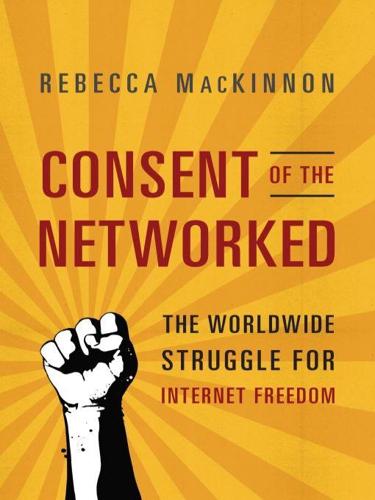
Consent of the Networked: The Worldwide Struggle for Internet Freedom
by
Rebecca MacKinnon
Published 31 Jan 2012
Also see his most recent book, Program or Be Programmed: Ten Commands for a Digital Age (New York: OR Books, 2010). 233 “The invention of a tool doesn’t create change”: Clay Shirky, Here Comes Everybody: The Power of Organizing Without Organizations (New York: Penguin Press, 2008), 105. 233 “cute-cat theory of digital activism”: Ethan Zuckerman, “The Cute Cat Theory Talk at ETech,” My Heart’s in Accra blog, March 8, 2008, www.ethanzuckerman.com/blog/2008/03/08/the-cute-cat-theory-talk-at-etech. 234 in 2007 WITNESS launched its own Video Hub: http://hub.witness.org; Yvette Alberdingk Thijm, “Update on the Hub and WITNESS’ New Online Strategy,” August 18, 2010, http://blog.witness.org/2010/08/update-on-the-hub-and-witness-new-online-strategy; Ethan Zuckerman, “Public Spaces, Private Infrastructure—Open Video Conference,” My Heart’s in Accra blog, October 1, 2010, www.ethanzuckerman.com/blog/2010/10/01/public-spaces-private-infrastructure-open-video-conference. 234 “Protecting Yourself, Your Subjects and Your Human Rights Videos on YouTube”: http://youtube-global.blogspot.com/2010/06/protecting-yourself-your-subjects-and.html. 234 2010 Global Voices Citizen Media Summit: Sami Ben Gharbia, “GV Summit 2010 Videos: A Discussion of Content Moderation,” Global Voices Advocacy, May 7, 2010, http://advocacy.globalvoicesonline.org/2010/05/07/gv-summit-2010-videos-a-discussion-of-content-moderation; and Rebecca MacKinnon, “Human Rights Implications of Content Moderation and Account Suspension by Companies,” RConversation blog, May 14, 2010, http://rconversation.blogs.com/rconversation/2010/05/human-rights-implications.html; 235 “Digital Maoism”: Jaron Lanier, “Digital Maoism: The Hazards of the New Online Collectivism,” Edge: The Third Culture, May 30, 2006, www.edge.org/3rd_culture/lanier06/lanier06_index.html. Also see Jaron Lanier, You Are Not A Gadget: A Manifesto (New York: Random House, 2010). 238 Students for Free Culture: http://freeculture.org. 238 In 2009 Sweden’s Pirate Party won two seats in the European Parliament: Tom Sullivan, “Sweden’s Pirate Party Sets Sail for Europe,” The Christian Science Monitor, June 8, 2009, www.csmonitor.com/World/Europe/2009/0608/p06s08-woeu.html (accessed August 15, 2011). 238 green parties have taken up Internet freedom: German Green Party politician Malte Spitz, for example, has taken up the fight against surveillance and censorship as a signature issue.
…
Earlier in the twentieth century, revolutionary attempts to create capitalism-free societies in the former Soviet Union, Eastern Europe, China, and elsewhere were rather disastrous when it came to human rights, let alone economic prosperity. Utopian ideologies such as Marxism-Leninism and Maoism produced demagoguery, totalitarianism, and genocide. In a controversial 2006 essay about what he calls “Digital Maoism,” and later in his 2010 book, You Are Not a Gadget, technologist Jaron Lanier warned of a “new online collectivism,” the digital variant of a concept that “has had dreadful consequences when thrust upon us from the extreme Right or the extreme Left in various historical periods.” Though there is much idealism and enthusiasm around the idea of the Internet being a place where the evils, hypocrisies, and general messiness of human economics, politics, and social relations can somehow be transcended, there is little evidence that human nature is any more virtuous or selfless in cyberspace than it is in the physical world.
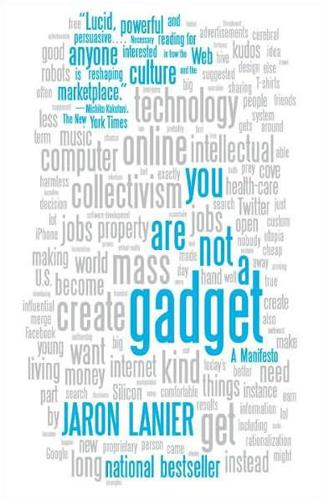
You Are Not a Gadget
by
Jaron Lanier
Published 12 Jan 2010
Classical Maoism didn’t really reject hierarchy; it only suppressed any hierarchy that didn’t happen to be the power structure of the ruling Communist Party. In China today, that hierarchy has been blended with others, including celebrity, academic achievement, and personal wealth and status, and China is certainly stronger because of that change. In the same way, digital Maoism doesn’t reject all hierarchy. Instead, it overwhelmingly rewards the one preferred hierarchy of digital metaness, in which a mashup is more important than the sources who were mashed. A blog of blogs is more exalted than a mere blog. If you have seized a very high niche in the aggregation of human expression—in the way that Google has with search, for instance—then you can become superpowerful.
…
To be fair, open culture is distinct from Maoism in another way. Maoism is usually associated with authoritarian control of the communication of ideas. Open culture is not, although the web 2.0 designs, like wikis, tend to promote the false idea that there is only one universal truth in some arenas where that isn’t so. But in terms of economics, digital Maoism is becoming a more apt term with each passing year. In the physical world, libertarianism and Maoism are about as different as economic philosophies could be, but in the world of bits, as understood by the ideology of cybernetic totalism, they blur, and are becoming harder and harder to distinguish from each other.
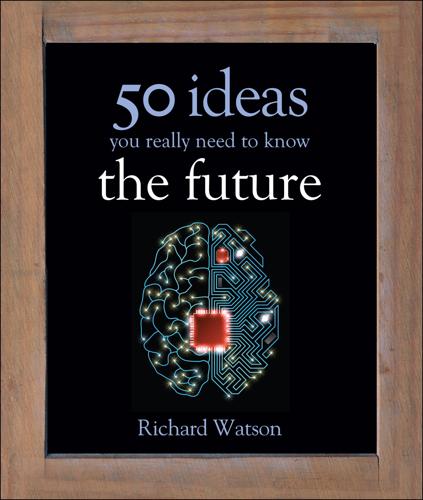
50 Future Ideas You Really Need to Know
by
Richard Watson
Published 5 Nov 2013
Web 2.0 builds upon this impulse. It’s YOUtube and MYspace and everyone is famous for 15 minutes and to 15 people. At its worst, this is postmodernism and subjectivism gone mad. It’s a world where idiocy, shallowness and superficiality reign supreme, because everyone’s life, skill or opinion is as good as everyone else’s. Digital Maoism? Jaron Lanier, sometimes referred to as the creator of the term “virtual reality,” believes that crowd intelligence is something of a fallacy analogous with the belief of hyperlibertarians that the free market is all-wise and ultimately benefits all. To quote Lanier: “The beauty of the Internet is that it connects people.
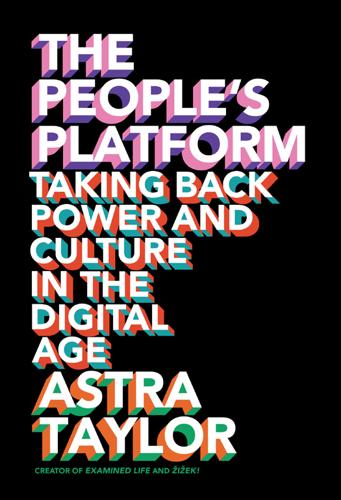
The People's Platform: Taking Back Power and Culture in the Digital Age
by
Astra Taylor
Published 4 Mar 2014
“The professional is being replaced by the amateur, the lexicographer by the layperson, the Harvard professor by the unschooled populace,” according to Andrew Keen, obstinately oblivious to the failings of professionally produced mass culture he defends. The Internet is decried as a province of know-nothing narcissists motivated by a juvenile desire for fame and fortune, a virtual backwater of vulgarity and phoniness. Jaron Lanier, the technologist turned skeptic, has taken aim at what he calls “digital Maoism” and the ascendance of the “hive mind.” Social media, as Lanier sees it, demean rather than elevate us, emphasizing the machine over the human, the crowd over the individual, the partial over the integral. The problem is not just that Web 2.0 erodes professionalism but, more fundamentally, that it threatens originality and autonomy.

Future Files: A Brief History of the Next 50 Years
by
Richard Watson
Published 1 Jan 2008
could be addressed to most of the planet, thus taking key debates far outside the scientific community. “Truth” is now whatever Wikipedia says it is. Moreover, truth is whatever Wikipedia says it is right now (which, by implication, may change tomorrow). As a counterpoint Jaron Lanier, who coined the term “virtual reality”, has predicted that collective intelligence — or digital Maoism — will have the same deadening and anti-creative effect as political collectivism. In other words, the wisdom of “idiots” will remove any opinion that does not fit with its own; if the online majority decides that 1+1=3, that will be the “truth”. Either way, it’s important that we recognize what computers can do already (more than most people realize) and then think about how this may eventually change — and change us.
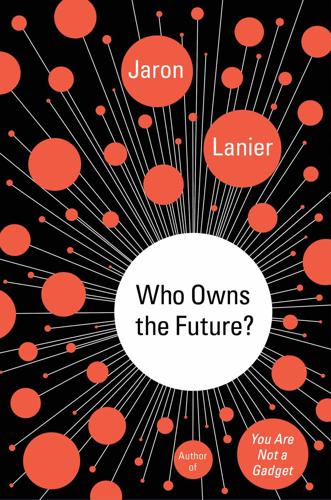
Who Owns the Future?
by
Jaron Lanier
Published 6 May 2013
To be more specific, we are finding empirical evidence [ . . .] that collaborative works are more positively received than single-authored works. We are studying this in the context of [ . . .] an online community where kids can create their animations, video games, and interactive art. We read your article on Edge.org on Digital Maoism and we were wondering if you know of anyone else who might be arguing that individual works are of higher quality than collective works. This came from one of the top computer science labs in the world. Unfortunately, I can become impatient when I attempt to answer questions like this. No one in the tech world practices what we preach about these ideas.
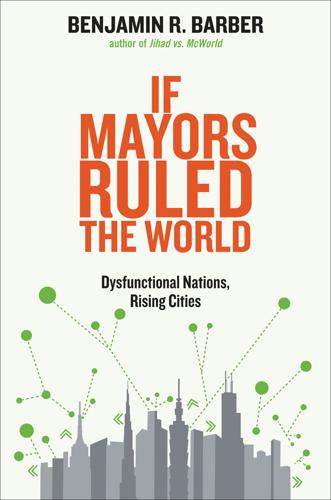
If Mayors Ruled the World: Dysfunctional Nations, Rising Cities
by
Benjamin R. Barber
Published 5 Nov 2013
Thus Jason Lanier (a digital insider and veteran of Atari and video games and an adviser to Second Life) has raised the alarm about the “fake friendship” that underlies social networks: such friendship is “just bait,” he says, “laid by the lords of the clouds to lure hypothetical advertisers.”26 Lanier also worries about the “digital Maoism” implicit in Internet groupthink. Lanier’s voice echoes Foucault’s and reminds us that what frees us from the old order may imprison us in the new. As the second great French critic of the Enlightenment argued (Rousseau was the first), the moral geometry that justified the rational orderliness of a new Age of Reason penology, substituting rehabilitative imprisonment for bodily punishment, was itself fraught.